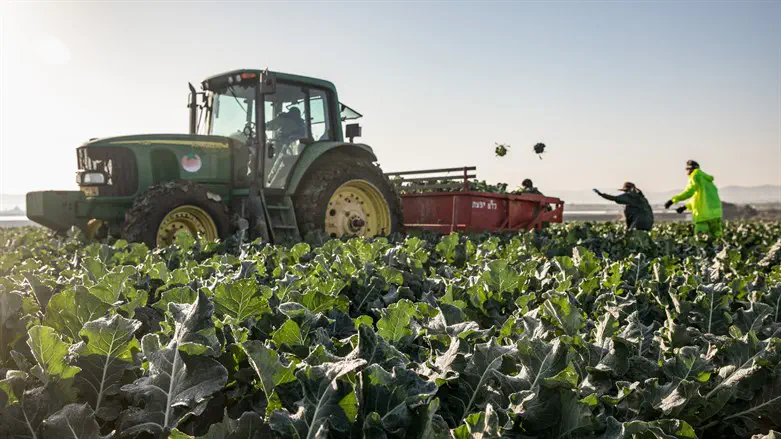
Two prominent rabbis from the haredi city of Bnei Brak have issued a warning regarding what they are calling, "Deceptive and false practices on the part of Arab farmers prior to the end of the shemittah year."
Shemittah is the Sabbatical year as defined in the Torah, when all agricultural work within the borders of the Land of Israel is forbidden. Produce that grows of its own accord during this year may be consumed under very restricted conditions. Parts of the Land of Israel that are indisputably owned by non-Jews may be farmed by their non-Jewish owners and their produce sold to Jews, but unscrupulous farmers often abuse this aspect of Jewish law and pass off Jewish-owned produce as originating from Arab-owned fields, enabling them to demand far higher prices in the haredi market, where only non-Jewish produce or produce sourced from beyond Israel's borders is consumed during the shemittah year. For this reason, a small but significant subset of the haredi community refrains from purchasing what is termed "non-Jewish" produce from within Israel's borders and only purchases produce from abroad.
Rabbi Chaim Eizik Landau and Rabbi Shevach Tzi Rosenblatt head the "Masores Hashemittah" organization that safeguards observance of the shemittah laws. They were informed by a mashgiach (supervisor) who works in the fields that vegetables labeled as "non-Jewish produce" by a certain Arab farmer had been harvested without any supervision and were about to be marketed to the haredi sector with falsified mehudar (superior) kashrut certification.
Rabbis Landau and Rosenblatt highlighted the farmer's deceptive practice, and noted that the fields in question are located near the Arab town of Jat in the so-called Galilee Triangle in the north of the country. They stressed that in order to be marketed as non-Jewish produce, crops must be supervised by qualified kashrut inspectors, from the time of their harvest onward, until they reach their ultimate destination.
"When I arrived to inspect the field, I entered the warehouses to see what was there," the supervisor related, "and I noticed five pallets of cucumbers covered over with canvas. When I asked what they were, the farmer told me that they weren't under our supervision and were headed for the general market, not to the haredi sector. I wandered around the fields, and checked in another few times at the warehouse, and suddenly I realized that one of the five pallets had disappeared.
"I asked where it had gone, and the farmer told me that the fifth pallet hadn't contained cucumbers at all but rather the work-clothes belonging to the laborers... I replied that I had seen many 'miracles' in my time as a kashrut supervisor inspecting the fields during shemittah year, but I'd never seen such an amazing conjuring trick where cucumbers turned into clothing... Thankfully, I discovered the 'sorcery' before it had a chance to have serious repercussions."
The two rabbis responded to the report by invalidating the kashrut certification of the farmer in question and his produce, not just temporarily but for all time.
"The farmer's response was insolent and aggressive and did not surprise the mashgiach, who is highly professional and fulfills his duties responsibly in order to safeguard the mehudar kosher status of the products he supervises, so that no doubts should arise as to their permissibility," the rabbis said. "As the end of the shemittah year approaches, extra-meticulous supervision becomes vital in fields owned by non-Jews and over produce certified as non-Jewish, as the owners are eager to make a profit and will use any means, however deceitful, to make money."
